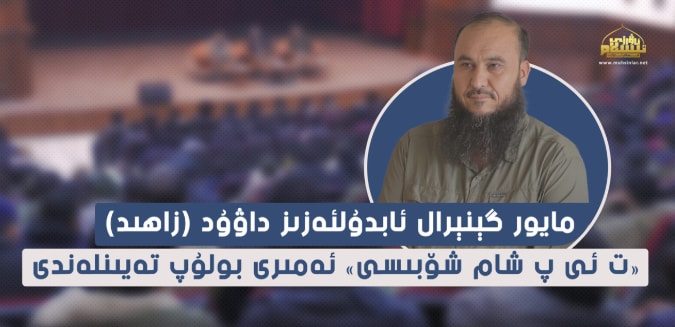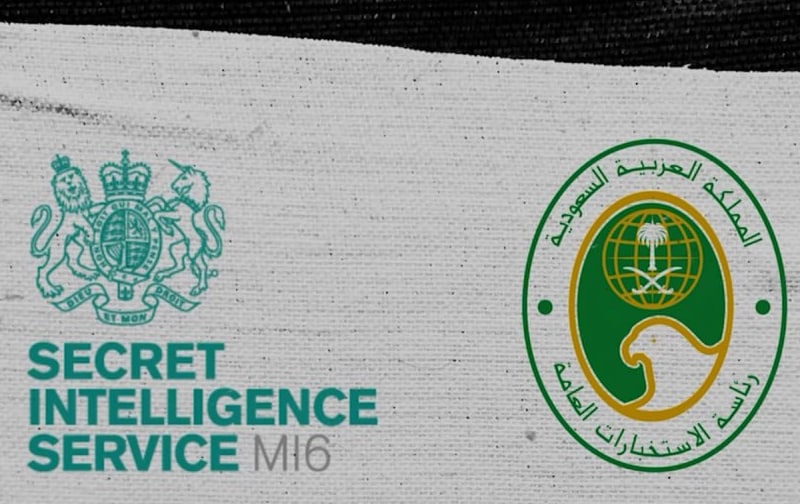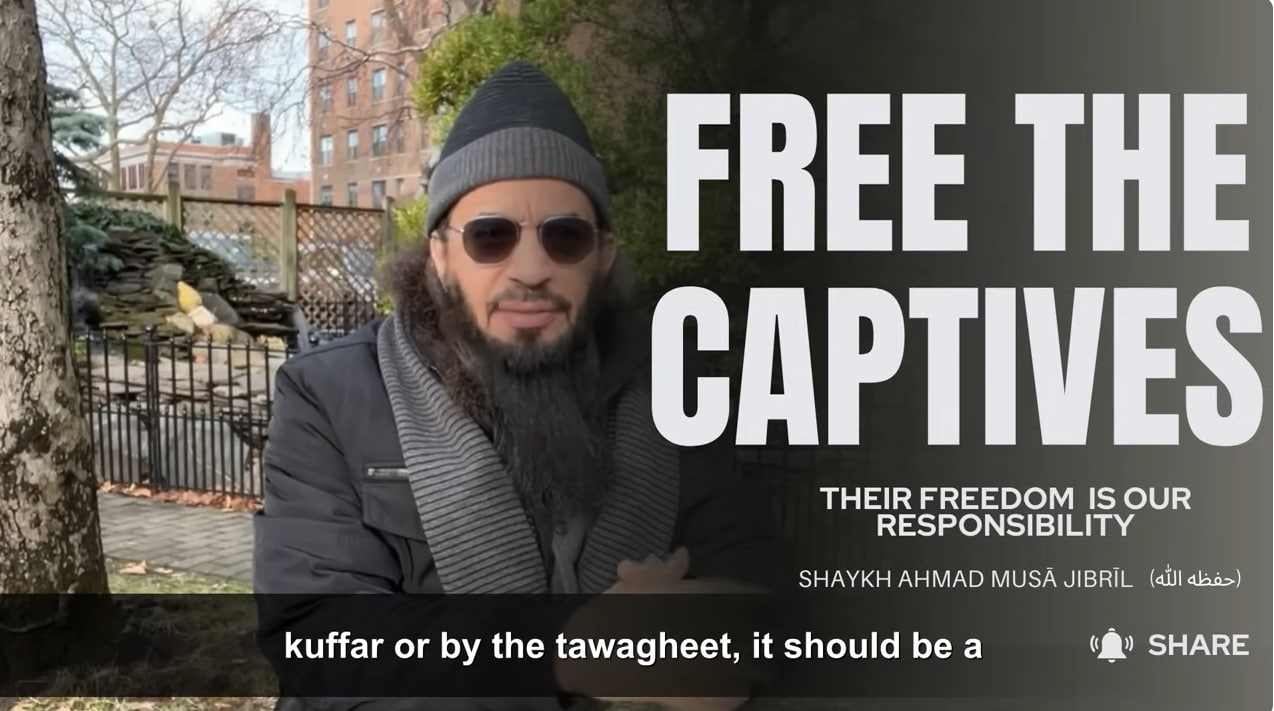The following report is a complimentary offering from MEMRI's Jihad and Terrorism Threat Monitor (JTTM).
On July 16, 2015, the Al-Muhajirun, a group of foreign fighters in Syria, released a video titled "Turning Point." It touts the recent victories of Jaysh Al-Fath, the coalition of Islamist factions that includes Jabhat Al-Nusra (JN), in the March 2015 takeover of the provincial capital city of Idlib and of the town of Jisr Al-Shughur in the same province. The video also features messages from a number of foreign fighters, including Westerners, who call upon other foreigners to join their ranks, and stress the equal and warm treatment they received from the local populace and mujahideen.

The slickly produced 40-minute video comes amidst mounting criticism by the Islamic State (ISIS) of JN and its allies, whom it accuses, inter alia, of failing to implement the shari'a in the areas that they control.[1] In that regard, the video notes how the shari'a is in fact being implemented in those areas, for example, how Islamic courts have been established and how they are aiding the local populace. Additionally, the video's focus on the good treatment of foreign fighters and on how their needs are met almost as soon as they arrive in Syria serves two purposes: it issues a call for foreign fighters to make hijra to Syria, but highlights only specific groups, such as Jaysh Al-Fath and JN. This can be seen as an attempt to dissuade incoming foreigners from joining the rival ISIS. In this context, the video reveals, according to one fighter, that many foreign fighters had in fact left Syria as a result of infighting between ISIS and JN; however, it attempts to woo them back to Syria by reassuring them that "there is no fitna [strife]" anymore there. Another subtle reference to the anti-ISIS message of the video is the use of ISIS nasheeds in it. The famous nasheed Ji'na Jundan Li-llah ("We have come, armies for Allah"), produced by the ISIS media company Ajnad, plays in the video.
Among the fighters appearing in the video are Europeans from Belgium, Germany and the Netherlands, as well as fighters from the Caucasus and Central Asia. Also, in several places the video mentions the Uyghur fighters who participated in the battle for Idlib and Jisr Al-Shughur. In May, the Turkestan Islamic Party (TIP), a jihad organization of Uyghur Muslims from East Turkestan (Xinjiang) in Western China, released a video documenting the group's role in the battle to take over Jisr Al-Shughur.[2]
Although it claims no affiliation to any jihadi group in Syria and notes that Al-Muhajirun is in fact "not a new fighting group... but rather a community of the muhajirun [foreigners] from different groups and with different interests,"[3] the message and content of the video strongly implies that the group is affiliated with Jaysh Al-Islam and its allies.
The video concludes with a portrayal of a state of unity, not only between the local and foreign fighters, but between the locals to those fighters, and between the local fighters of the different groups. It also incorporates a segment from JN leader Abu Muhammad Al-Joulani's message to Jaysh Al-Fath following the takeover of Idlib, in which he called upon the groups to remain united.[4] This attempt to portray a state of harmony among all the jihadis in Syria is summarized in the final portion of the video, in which a narrator states:
"And now, after we showed you the real and shining image of what is the reality of the mujahideen in Al-Sham, this image which several parties tried to distort for their personal interests and for various goals... but, by the grace of Allah, and as you saw on the mujahideen being merciful among themselves and Muslims, and their unified ranks in fighting their enemies, which lead to great victories and successive successes."
The video was released via Al-Muhajirun's Twitter account (@AlMuhajirun1), in Arabic, English, German, and Turkish versions.
Below is a summary of the video. Direct quotations are based on the original English subtitles:
The video begins with a quick chronological overview of the jihad in Syria since the beginning of the Syrian revolution. It focuses on the establishment and activities of Jaysh Al-Fath, namely its military achievements in northwestern Syria, incorporating interviews with various fighters and commanders, include from the Ahrar Al-Sham and Ansar Al-Sham groups.
Interspersed in this segment are interviews with civilians and fighters praising the sacrifices of the foreign fighters. They also repeatedly note the equal treatment given to those fighters.
The next segment includes various message from foreign fighters, including Westerners:
Dutch Jaysh Al-Fath fighter Abu Al-Baraa Al-Holandi discusses why he decided to join the jihad in Syria, saying that he couldn't stand on the sidelines watching Syrian Muslims being killed by the Syrian regime. He also says how back in the Netherlands, although he had a house, car, and money, he felt that something was missing. "You live [in the Netherlands] in a position without honor as a Muslim, you live under the tawaghit [oppressors], [and] you always have to be careful of what you say," he says.

Abu Al-Baraa Al-Holandi
Belgian fighter Abu Umayma Al-Beljiki expresses satisfaction at coming to Syria two years ago, and says that Westerners from Europe, the U.S., and Australia are among the fighters in Syria. He also speaks of the sense of tranquility and fearlessness one feels while stationed on the frontlines.
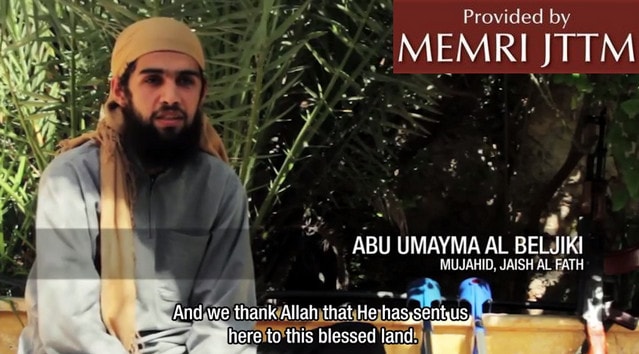
Abu Umayma Al-Beljiki
A fighter who speaks in English, Abu Abdullah Al-Muhajir, praises the establishment of Jaysh Al-Fath and the victories that it has achieved. He also asks how Muslims living in the West can continue to live there while Muslims in Syria are being killed and tortured.
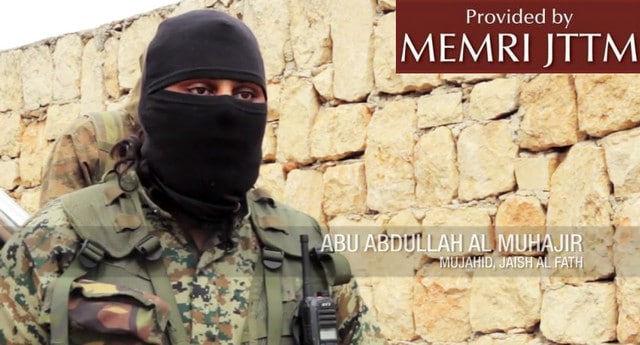
Abu Abdullah Al-Muhajir
A fighter from Turkmenistan, Abu Suleyman Al-Turkmani, who appears to be a member of a Turkmen group assigned to the city of Latakia, notes the Syrians' warm treatment of foreign fighters. He also notes the unity among the Ansar and Muhajireen fighters in battle.

Abu Suleyman Al-Turkmani
Kurdish fighter Abu Muaz Al-Kurdi tells Kurdish youths: "Come to [Al-]Sham to support the religion and protect your brothers, sisters, and children..."
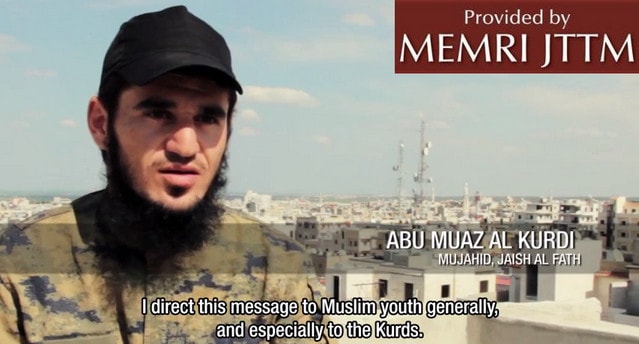
Abu Muaz Al-Kurdi
Another fighter from Central Asia, Yahya Al-Bukhari, directs a general message to Muslims in that region: "Come to [Al-]Sham... [and experience] honor," he says. He also notes that there are Uyghur fighters in Syria.
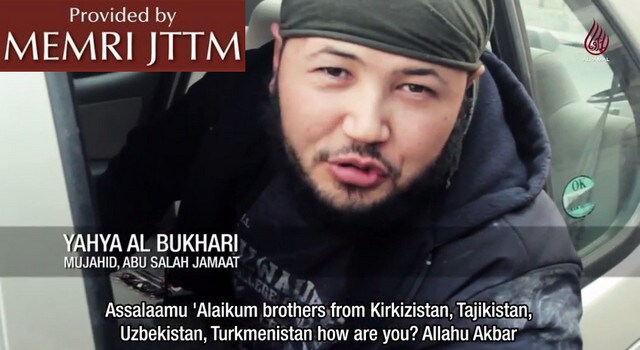
Yahya Al-Bukhari
German Jaysh Al-Fath fighter Abu Zubair Al-Almani is seen driving into Idlib, and telling about notes how quickly the city was conquered by the mujahideen. In another scene, Al-Almani speaks of the warm welcome he and other foreign fighters received when they arrived in Syria. He also expressed the sense of uttermost happiness he felt when he entered the country for the first time: "[S]imply indescribable, like a new born," he says. Once in Syria, he said, his expectations of life under harsh conditions, sleeping in tents and having no food, were shattered. "The first day we arrived, we slept in a villa. Not in tents," he says.
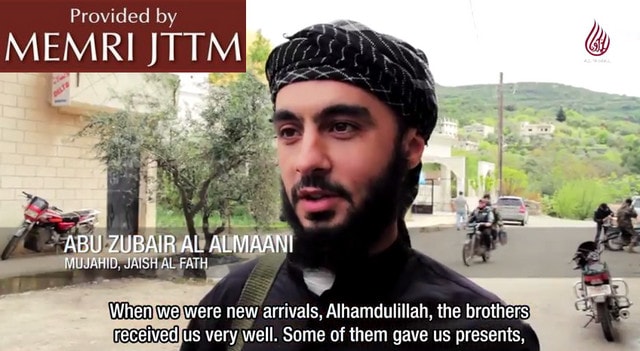
Abu Zubair Al-Almani
Chechen fighter Abu Ibrahim Al-Shishani notes that many foreign fighters had left Syria due to the "fitna" (strife) – a reference to the jihadi groups' infighting. Al-Shishani nonetheless calls upon those to return to Syria by reassuring them that "there is no fitna." He also says: "If you remain at home, Allah will ask you on the Day of Judgement: 'Why didn't you perform jihad? Why did you leave the jihad?'"

Abu Ibrahim Al-Shishani
Source: Twitter.com/AlMuhajirun1, July 16, 2015.
Endnotes:
[1] See MEMRI JTTM report Issue X Of ISIS's English-Language Magazine 'Dabiq' – A General Review, July 14, 2015.
[2] See MEMRI JTTM report Video Released By Turkestan Islamic Party (TIP) Documents Group's Role In Takeover Of Strategic Town In Idlib, Syria, May 1, 2015.
[3] https://archive.org/details/AlMuhajirunStatement001, June 16, 2015.
[4] See MEMRI JTTM report Jabhat Al-Nusra Leader: We Do Not Intend To Rule Exclusively In Idlib, April 1, 2015.



